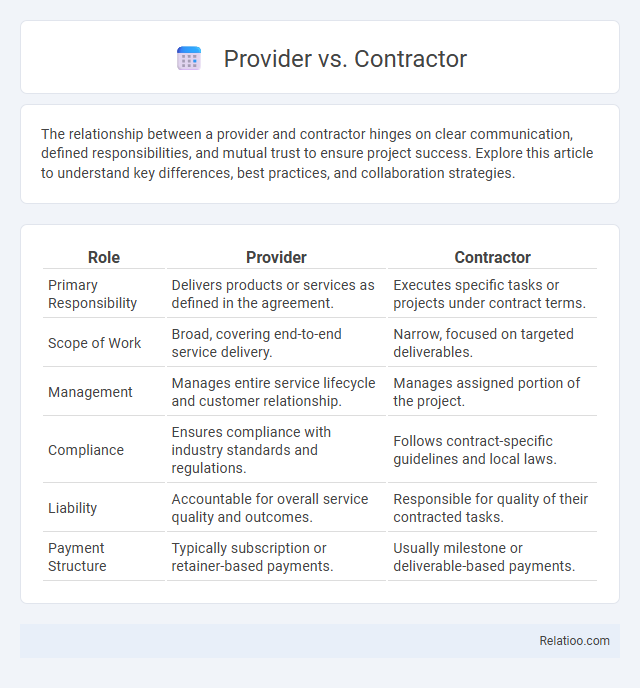The relationship between a provider and contractor hinges on clear communication, defined responsibilities, and mutual trust to ensure project success. Explore this article to understand key differences, best practices, and collaboration strategies.
Table of Comparison
| Role | Provider | Contractor |
|---|---|---|
| Primary Responsibility | Delivers products or services as defined in the agreement. | Executes specific tasks or projects under contract terms. |
| Scope of Work | Broad, covering end-to-end service delivery. | Narrow, focused on targeted deliverables. |
| Management | Manages entire service lifecycle and customer relationship. | Manages assigned portion of the project. |
| Compliance | Ensures compliance with industry standards and regulations. | Follows contract-specific guidelines and local laws. |
| Liability | Accountable for overall service quality and outcomes. | Responsible for quality of their contracted tasks. |
| Payment Structure | Typically subscription or retainer-based payments. | Usually milestone or deliverable-based payments. |
Introduction to Providers and Contractors
Providers and contractors play distinct roles in delivering services and executing projects, with providers typically offering ongoing services or goods, while contractors focus on specific tasks or projects within a defined scope. You must understand that providers often maintain long-term relationships and handle continuous needs, whereas contractors engage for fixed-term assignments, bringing specialized expertise. Clarity in these roles ensures your business can effectively manage resources, timelines, and expectations for successful collaboration.
Defining Providers and Contractors
Providers deliver goods, services, or expertise based on an established agreement, often within sectors like healthcare, IT, or education. Contractors are individuals or firms hired to perform specific tasks or projects with defined scopes and timelines, typically in construction, consulting, or freelance work. Clear distinctions exist as providers maintain ongoing service commitments, while contractors focus on project-based engagements with predefined deliverables.
Key Differences Between Providers and Contractors
Providers deliver services based on ongoing agreements, often with flexibility in scope and duration, while contractors typically operate under fixed-term contracts with defined deliverables and deadlines. Providers maintain continuous client relationships and may offer support, updates, or maintenance, unlike contractors who complete specific projects and disengage upon completion. Payment models differ as providers usually charge recurring fees, whereas contractors are often compensated through lump sums or milestones tied to project progress.
Roles and Responsibilities Comparison
Providers typically deliver services or products directly to clients, managing client relationships and ensuring service quality. Contractors focus on specific tasks or projects outlined in contracts, executing defined work scopes with limited client interaction. Providers manage ongoing service commitments and support, whereas contractors handle time-bound projects with clear deliverables and milestones.
Legal and Regulatory Considerations
Legal and regulatory considerations differentiate providers, contractors, and subcontractors primarily in liability, compliance obligations, and contractual responsibilities. Providers typically face direct regulatory oversight and must adhere to specific industry standards, while contractors assume responsibility for project execution and compliance with local laws, often managing multiple subcontractors. Your understanding of these distinctions ensures proper risk management, contractual clarity, and adherence to applicable legal frameworks in service delivery.
Cost Implications: Provider vs Contractor
Providers typically offer bundled services with predictable pricing models, leading to controlled and transparent cost implications over project timelines. Contractors often incur variable expenses due to labor rates, scope changes, and material costs, potentially increasing overall expenditures. Evaluating provider versus contractor costs requires detailed analysis of service inclusivity, risk management, and contract flexibility to align with budget constraints and project goals.
Flexibility and Scalability Factors
Flexibility in providers typically involves customizable service options that adapt to your evolving business needs, while contractors offer specialized skills with limited long-term adaptability. Providers generally scale operations through established infrastructure and resources, supporting rapid expansion, whereas contractors often require onboarding new individuals for growth, which can slow scalability. Your best choice balances flexible service delivery and scalable capacity to match fluctuating demands efficiently.
Quality of Service: Provider vs Contractor
Quality of service by a provider often ensures consistent standards through established processes and ongoing support, while contractors may offer flexibility but with variable service quality depending on contract terms. Providers typically invest in long-term client relationships and infrastructure to maintain high service levels, whereas contractors deliver specific tasks that might lack comprehensive quality control. Your choice between a provider and contractor should weigh the reliability and consistency of service quality against the need for specialized or short-term expertise.
Industry-Specific Use Cases
In construction, contractors manage project execution while providers supply specialized materials or services tailored to industry needs such as electrical or plumbing systems. In healthcare, providers deliver direct patient care, and contractors handle facility maintenance or IT infrastructure, ensuring compliance with strict regulations. Technology sectors rely on providers for software solutions, whereas contractors offer implementation and support services critical for customized enterprise operations.
Choosing Between a Provider or Contractor: Key Considerations
Choosing between a provider and a contractor depends on Your project scope, budget, and desired level of control. Providers typically offer comprehensive services with ongoing support, ideal for continuous needs, while contractors focus on specific tasks or projects with defined timelines. Evaluate Your priorities, such as flexibility, expertise, and cost-efficiency, to make an informed decision.

Infographic: Provider vs Contractor
 relatioo.com
relatioo.com